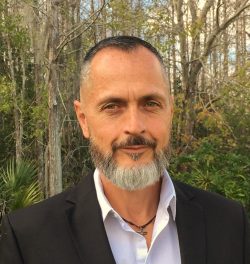
F. Eloy Hernández is a Professor in the Department of Chemistry, College of Sciences at the University of Central Florida, and holds a joint appointment in CREOL/The College of Optics and Photonics, UCF. After receiving his Ph.D. through an international educational “sandwich” program between Venezuela and France in 1996, he spent three years as a postdoctoral associate in the physics department at IVIC-Venezuela, and three years as Visiting Research Scientist in CREOL before joining the Department of Chemistry at UCF in 2002. His research focuses in the application of state-of-the-art two-photon circular dichroism (TPCD) to: elucidate the fundamental activity of chiral molecules and macromolecules in biological processes, mainly those involved in Alzheimer disease; understand the properties of optically active asymmetric catalysts used in the pharmacological and flavor industry; design novel metamaterials leading to the construction of perfect lenses and cloaking devices; design novel chemical, explosive, radiological, and biological sensors for environmental analysis, homeland security and biomedicine. Hernández’s research has been continuously supported by different federal agencies and industry including the National Science Foundation, the Department of Defense and the Department of Energy. His remarkable scientific contributions have resulted in many publications in high-impact peer-reviewed journals, multiple contributions to national and international conferences as well as invited talks, the development of important international collaborations, and the graduation of several graduate Ph.D. and Master students. Hernández has also received several awards including the ACS Orlando Section Outstanding Chemist Award and two UCF Research Incenticve Awards (RIA), and has served as Associate Editor of the IEEE Journal of Photonics since early 2014.
With great passion for teaching and learning, and a firm dedication to impart knowledge to others and develop their critical thinking, he devotes much of his time to meditate about new ways to improve the education system in the XXI century. Hernández’s STEM research focus resides in the investigation of the effectiveness of a contemporary teaching style that emphasizes in dynamic active-learning, where students are constantly involved in engaging activities to make them want to do the work, and proposes a holistic approach that combines the traditional teaching style with flip-classroom, inquiry, clickers and social network, among others. He believes that the amalgamation of philosophies and knowledge across disciplines, thought to be immiscible, have the potential to create a unique alloy of synergy between pure and social sciences, education and management strategies. Studying teaching practices and student learning outcomes he is exploring new ways to deliver excellence in instruction, enhance the practice and profession of teaching, and bring to educators the recognition and reward granted to other forms of scholarly work. Since 2010 Hernández has been involved in the development of high school sciences summer camps, the assessment of Social Networking platforms in education, the development of a course-based undergraduate research experience (CURE), and SoTL in a senior level undergraduate STEM course fusing a reversed learning scheme with an informal learning space. Hernández’s SoTL in STEM have resulted in several articles in the Journal of Chemical Education and presentations in specialized national conferences, funding from the ACS and NSF, as well as two UCF Teaching Incentive Program (TIP) awards.